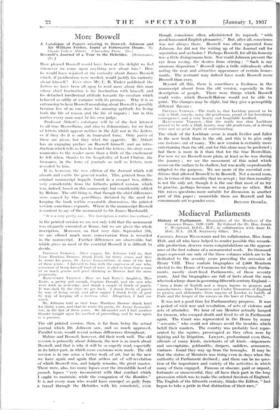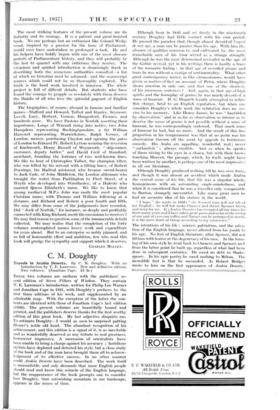Mediaeval Parliamerits
. C. Wedgwood, D.S.O.,• M:P., in collaboration with Anne. D.
Holt, M.A. (H.M. Stationery Office. .308.) •,
COLONEL .Tostau WEricwoon and his collaborator, Miss -Anne Holt, and all. who have helped to render possible this remark-
able production, deserve warm congratulations on the appear- ance of the first volume of a monumental work. Its thousand pages represent one only of the three volumes which are to be dedicated to the seventy years preceding the accession of Henry VIII. They contain biographies of 2,600 Members elected to the House of Commons for the twenty-nine Parlia- ments, mostly short-lived Parliaments, of those seventy years. And the biographies are full of facts about the men who took a large share in governing fifteenth-century England- " from a Duke of Norfolk and a dozen barons to graziers and -manufacturers—from Treasurers and Under Treasurers of England to pirates and alchemists—from mayors of London to bailiffs of Poole and the keeper of the coneys on the lawn at Clarendon."
It was not a good time for Parliamentary progress. It was n period of civil war and revolution, of acts of violence and acts of attainder. We hear of one Member actually hanged for treason, who escaped death and lived to sit in Parliament again. The Court was represented in the House by many " servants," who could not always avoid the troubles which befell their masters. The country was probably best repre- sented by the squires, preoccupied as they often were by fighting and by litigation. Lawyers, predominant even then, officials of many kinds, merchants of all kinds—shipowners and sea-captains, goldsmiths, drapers, saddlers, armourers, vintners—found they way up from the borotighs. It may be that the status of Members was rising even in days when the authority of Parliament declined ; and there can be no ques- tion of the importance and variety of the activities in which
many of them engaged. Famous or obscure, paid or unpaid, fortunate or unsuccessful, they all have their part in the long
procession which was to Make the ordered fieedorn of England. The English of the fifteenth century, thinks the.Editor, " had begun to take a pride in that distinction of their race." The most striking features of the present volume are its industry and its courage. It is a patient and great-hearted book. No one perhaps but an enthusiast like Colonel Wedg- witod, inspired by a passion for the fame of Parliament, would ever have undertaken so prolonged a task. He and his helpers have boldly begun with one of the most obscure periods of Parliamentary history, and they will probably be the last to quarrel with any criticisms they receive. The vivacious and spirited introduction is disarmingly frank in describing both the numerous authorities consulted—a list of which no historian need be ashamed—and the manuscript sources which could not be so thoroughly explored. The truth is the hard work involved is immense. The whole project is full of difficult details. But students who have found the courage to grapple so resolutely with them deserve the thanks of all who love the splendid pageant of English history.
The biographies, of course, abound in famous and familiar names—Stafford and Howard, Talbot and Stanley, Seymour, Lovell, Lucy, Herbert, Vernon, Hungerford, Fiennes, and hundreds more. We have Pastons in Norfolk asserting their importance, Longs of Wraxall rising into notice, two John Hampden representing Buckinghamshire, a Sir William Harcourt representing Warwickshire, Ralph Verney, of London, mercer, purchasing Claydon and opening the gates of London to Edward IV, Robert Lytton securing the reversion of Knebworth, Henry Russell of Weymouth, " ship-owner, customer; deputy butler," and David Cecil of Stamford, merchant, founding the fortunes of two well-known lines. We like to hear of Christopher Talbot, the champion tilter, who was killed by his servant with a tilting lance, of Robert Poynings, the Radical aristocrat who became sword-bearer to Jack Cade, of John Middleton, the London alderman who brought the Water from Paddington to Fleet Street, of a 1Vryth who developed into Wriothesley, of a Hulcote who married Queen Elizabeth's nurse. We like to know that among media' eval M.P.s John was easily the most popular Christian name, with Thomas and William following at a distance, and Richard and Robert a poor fourth and fifth. We may differ from some of the judgements here recorded. Did " Jock of Norfolk," for instance, so deeply and profitably connected with King Richard, merit the encomium he receives ? We may find reason to question some of the innumerable details collected. We may realise that the completion of the forty volumes contemplated means heavy work and expenditure for years ahead. But to an enterprise so nobly planned, and so full of honourable effort and ambition, few who read this book will grudge the sympathy and support which it deserves.
CHAIILES MALLET.







































 Previous page
Previous page